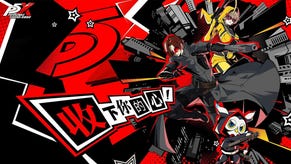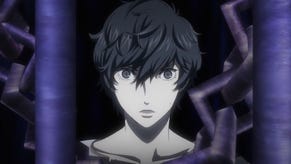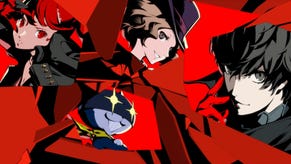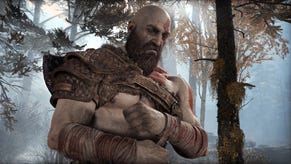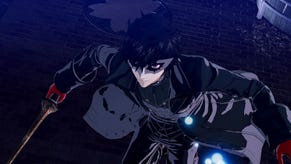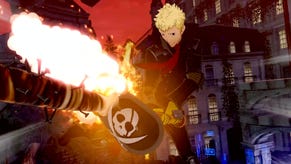Persona 5's Katsura Hashino on His Favorite Characters, Japanese vs. Western Storytelling, and Anxiety
"So many people are getting carried away with their anxiety that they’re losing touch with what’s really going on."
This article first appeared on USgamer, a partner publication of VG247. Some content, such as this article, has been migrated to VG247 for posterity after USgamer's closure - but it has not been edited or further vetted by the VG247 team.
Persona 5 launched yesterday in North America, bringing to a close some eight years of development. For director Katsura Hashino, it's also a personal milestone, marking the end of a 20-year tenure that stretches all the way back to the days of the Super NES.
Hashino has moved on, but he was still gracious enough to answer a few of our questions about Persona 5 via email, where he talks about some of his favorite characters, the differences between North American and Japanese media, and how Persona 5 reflects the changes in Japanese society.
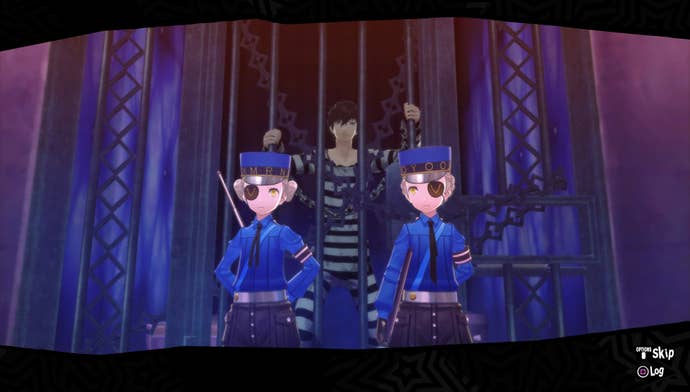
USgamer: Can you give us some insight into your philosophy on RPG development? What makes a good RPG in your mind?
There are countless factors that go into making a good RPG, but I think what it ultimately boils down to is whether the game leaves a lasting impression on players. Or, from the player’s perspective, they can make the game memorable. I think the greatest joy for many game fans is finding a title that not only provides short-term fun, but stays in their hearts for years after.
Role-playing is all about experiencing someone else’s life. My goal is to create games that affect the players’ real lives in some way. But that sort of change can’t be forced on them by creators—it comes from being personally affected by the game. By experiencing a fictional situation through the eyes of a character, you can step back and evaluate your own life in the real world. Just like people do after watching a great movie or reading a good book. It’s all about empathy, immersion, and excitement—three things games can provide better than any other form of entertainment. That’s the biggest reason I devote myself to creating RPGs.
I worked on Persona 5 with the hope that it would provide a memorable experience to as many players as possible. I want only for this latest entry to leave a lasting impression on people, however small it may be.
USgamer: Why did you decide to make hand-crafted dungeons instead of randomized dungeons like in the past? Was it difficult?
We wanted to fill the dungeons in Persona 5 with thrilling sequences that suited the Phantom Thieves theme, with challenges that would require the protagonist to consult his teammates to overcome.
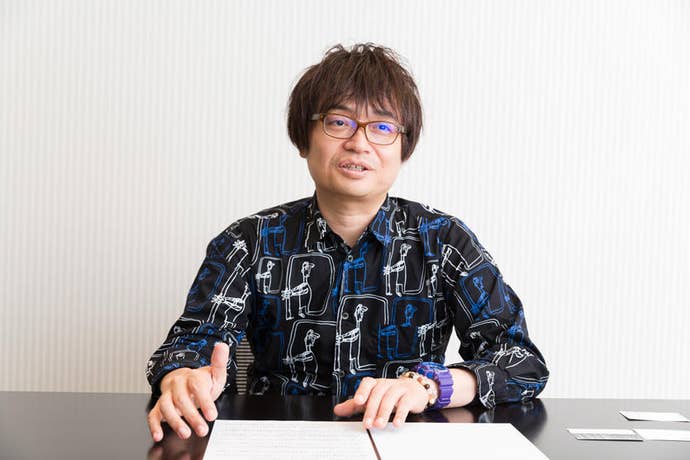
We also that thought people who played the previous game would appreciate a drastic change to the dungeon system. Because gameplay in Persona 4 was balanced between high school life, the major story sequences, and dungeon exploration, we kept dungeons randomly generated in service to resource allocation. It was a big decision to change that approach for Persona 5. We thought it would give the game additional appeal to even more players, making it the culmination of Atlus’ RPG pedigree. This thought process let us concentrate on development with a clear goal in mind.
That doesn’t mean we didn’t have a tough time making the game, though. Designing static dungeons proved challenging for many of the less experienced members of the team, and required a lot of iteration to build the best versions. Hopefully players enjoy all our hard work when they dive into Persona 5’s dungeons.
USG: Who are some of your favorite Persona characters from over the years?
As the person who creates the characters, it’s only natural that the ones most dear to me are the ones I had the hardest time constructing. It’s always tough to come up with the characters who set up the game—the ones who help give the players their initial motivation. In Persona 4, that was Yosuke, Chie, Yukiko, and especially Teddie. In Persona 3, it was Junpei, Yukari, Akihiko, and Mitsuru. When we design these characters, we put a lot of effort into making them likeable for players, and in the process, I wind up liking them a great deal, too.

The first thing I do when creating a character is come up with an image for the conclusion of the story. Then I set the circumstances in which the protagonist—the player’s avatar, their anchor in the world—finds themselves. From there, I can start adding characters to form a bond with the protagonist, people who complement each other and will encourage one another to reach the story’s conclusion. In Persona games, for example, the protagonist discovers a super power and travels back and forth between reality and another world. If this happened in real life, describing it as a big deal would be a serious understatement. That’s why characters who serve affirming, sympathizing, and guiding roles are crucial to have in the story. That’s how we decide the roles of the first party members you meet. There’s no easy formula to creating characters. It’s a rolling process that iterates with each new evaluation and comment from the staff during development, compelling us to tweak and tune each character as much as we can right up to release. Persona 5 is filled with characters we poured our hearts into. I can’t wait for you to meet them.
USG: Are you surprised by Persona's popularity in North America?
Living in Japan, I can’t get direct feedback, so it’s hard for me to fully understand the overseas popularity. Persona 5 is unabashedly Japanese, going so far as to cover Japanese politics a bit. I can’t imagine what kind of response that will garner from western fans. But I keep hearing that they’re excited for its release, so I’m interested to see how the story is received overseas. Japanese genre fiction tends to deal with heroes fighting invaders from outside their society. In the west, however, these types of stories typically deal with outcasts within a society. Think Batman and the Joker, a relationship that has always struck a chord with fans. In the same vein, Persona 5 tells a story in which the heroes battle against villains risen from within their own society. Perhaps we’ll get a different response from overseas players than we have from previous games. I’m excited and anxious to find out.
Persona 5 is unabashedly Japanese, going so far as to cover Japanese politics a bit. I can’t imagine what kind of response that will garner from western fans.
I hope that whatever I work on in the future, whether it’s Persona or otherwise, becomes something that moves the hearts of players across different regions and cultures. In fact, I aim to raise the level of empathy my games generate. Last year, I stepped down from development of the Persona series to focus on a brand-new fantasy RPG. Given the tremendous support Atlus fans have shown us in Japan and overseas, now felt like the right time to tackle this new project (Note: This is Project Re Fantasy). And while this game will take place in a world quite unlike Persona or Shin Megami Tensei’s, I will strive to continue providing an incomparable experience for players, crafting characters they can empathize with and through whom they re-examine their own, real lives. I hope Persona 5 will be met with as much positive reception overseas as it has enjoyed here in Japan. I look forward to seeing fans support our new RPG, too.
USG: You've said that Persona 5 reflects the changes in Japanese society. What sort of changes do you perceive, and how are they incorporated in Persona 5?
Whenever a political scandal occurs in Japan, people go crazy on social media sites. I’ve seen data that suggests these sorts of tweets and posts are only made by a vocal minority, but considering how many people view them, their impact on society can’t be dismissed. Persona 5’s story explores the notion of Phantom Thieves "punishing bad adults." As the story progresses, however, the characters—and the player with them, hopefully—begin to wonder, "Who are we to punish these people?" "What, exactly, drives adults to dark desires?" We wanted to leave these moral implications open to player interpretation, without presenting clear answers. That’s one of the biggest things that motivated us while working on Persona 5.
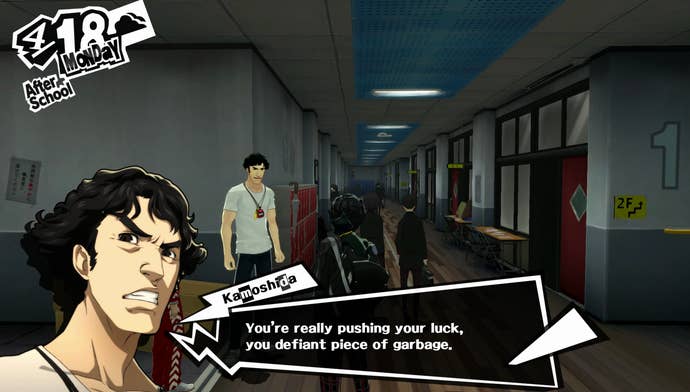
In fact, in both Persona 3 and Persona 4, there comes a point where the justice the protagonist and his friends believe in is challenged, and they must face the true darkness embodied within the game. Part of our goal at Atlus is for players to not experience someone else’s story, but rather their own. The bond they share with the game’s characters is what gives them the strength to brave this darkness together. The same applies to Persona 5. "Bond" is a not a precise word, but I wanted to give it very specific meaning and power in our games. I wanted to show gamers that bonds could be strong enough to cause change in the world, as exemplified in the Persona series—something some people think is so rare in the real world that it only exists in fiction.
This might seem a little out there, but I feel like these days the notion of a "bond" may very well be just a game and anime thing. We depicted bonds in Persona 3 and Persona 4 as an important aspect of life, and took that even further in Persona 5 by examining how the strength of your beliefs can bring together people who share your ideals, even if they feel they have no place in society. I wanted the characters to join up not by coincidence, but by finding a community where their very existence provides support for the others—something I believe is crucial for the coming age. This is the foundation of Persona 5’s Confidant system and how the protagonist connects with the people he meets.
I chose a fantasy setting for my next project because I wanted to explore the concept of "anxiety"—something many people are feeling right now—in a setting that is more relatable globally. I touched upon this in Persona 5, but not much has changed in the world since we wrapped up development on it. In fact, so many people are getting carried away with their anxiety that they’re losing touch with what’s really going on. Regardless of the direction your life is taking, it’s important that you acknowledge and accept uncertainty. Only then can you effectively combat anxiety and move forward with certainty. Meeting others who feel the same as you is one of the best ways to overcome hardships. This became the core of Persona 5’s theme as a modern, coming-of-age story.
That probably comes off as deep and heavy, but rest assured—Persona 5 is entertainment first and foremost. So please give it a try.


